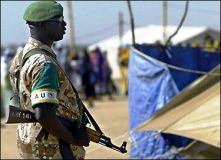AU urges restraint in Sudan’s Darfur after deadly attacks
Sept 30, 2005 (KHARTOUM) — The African Union (AU) appealed for restraint Friday after deadly attacks by Arab militias in Darfur and neighbouring Chad threatened to wreck months of political, security and humanitarian efforts.
 “We are issuing an urgent appeal to all parties involved to halt all hostilities,” AU spokesman in Khartoum Nureddin Mezni told AFP.
“We are issuing an urgent appeal to all parties involved to halt all hostilities,” AU spokesman in Khartoum Nureddin Mezni told AFP.
He confirmed there had been a deadly attack by marauding horse- and camel-riding Arab gunmen in northeastern Chad against a camp of displaced Darfurians but could not confirm the UN’s death toll of 29.
“Such acts have serious humanitarian repercussions since these people are already living a tragedy,” Mezni said, adding that an investigation into the incident was under way.
Mezni also said that such incidents were a blow to ongoing negotiations between Darfur rebel groups and the Sudanese government to end the 30-month-old civil conflict.
The Darfur war has pitted ethnic minority black Darfurians against government troops and their proxies — sometimes described as Janjaweed — since February 2003, killing up to 300,000 people and displacing more than two million.
The conflict spilled over into neighbouring Chad this week, when 75 people, including 55 herdsmen, were killed in the village of Madayoun near the border with Sudan.
Chadian President Idriss Deby — himself a Zaghawa, one of the main tribes in Darfur — charged the attack had been carried out by Janjaweed.
The word Janjaweed is an Arab acronym which roughly means “men who ride horses and carry G3 guns”, in reference to a German-made automatic rifle. They have been accused of carrying out massacres and rapes against local tribes.
The new round of talks that kicked off earlier this month in Nigeria under the aegis of the African Union have again stalled, with only part of the Darfur rebel factions represented in the negotiations.
The latest killings have prompted the United Nations’ top aid official Jan Egeland to warn that all humanitarian operations may have to be halted.
There are around 11,000 UN-supervised aid workers bringing relief to civilians in the western Sudanese region, where the UN has said one of the world’s worst humanitarian crises was taking place.
(AFP/ST)
